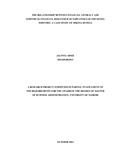| dc.description.abstract | The study on financial literacy has continued to gain greater prominence in the field
of education and beyond. The objective of this study was to examine the relationship
between financial literacy and individual financial behaviour of employees of the
hotel industry with focus on Serena Hotels. The study population was 1327
employees from 9 properties of Serena Hotels in Kenya. A sample of 140 employees
was selected using stratified random sampling technique. Primary data was collected
through semi-structured questionnaires. The questionnaires were edited for accuracy
and completeness. The collected data was tested for validity and reliability. 112
questionnaires were sent back complete and accurate representing a response rate of
80%. Quantitative data was analyzed through descriptive statistics while qualitative
data was analyzed through content analysis. The study also used regression analysis to
establish the extent to which financial literacy, age, level of education, gender and
level of income influence individual financial behaviour. The model significance was
tested at 95% confidence level. Data presentation was done by use of tables. The
study findings revealed that the employees of Serena Hotels had a moderate
background of financial literacy. The results of the regression showed that there was a
positive relationship between financial literacy and individual financial behaviour of
employees of Serena Hotels. Age, level of education and income also had a direct
relationship with individual financial behaviour. On the other hand it was found that
there was an inverse relationship between gender of respondents and individual
financial behaviour. Males were found to be more financially literate than females.
From the results of the findings, the study recommends that employers in the hotel
industry review their employees pay to level off with those of employees in other
sectors of the economy, this is because most of the respondents cited their inability to
save, plan for retirement, purchase insurance, set long term financial goals and pay
bills on time due to the relatively low pay they received. The study also recommends
that employees be on the lookout for their own financial well-being by sponsoring
themselves for financial trainings, and having other sources of income to improve
their financial health. | en_US |

